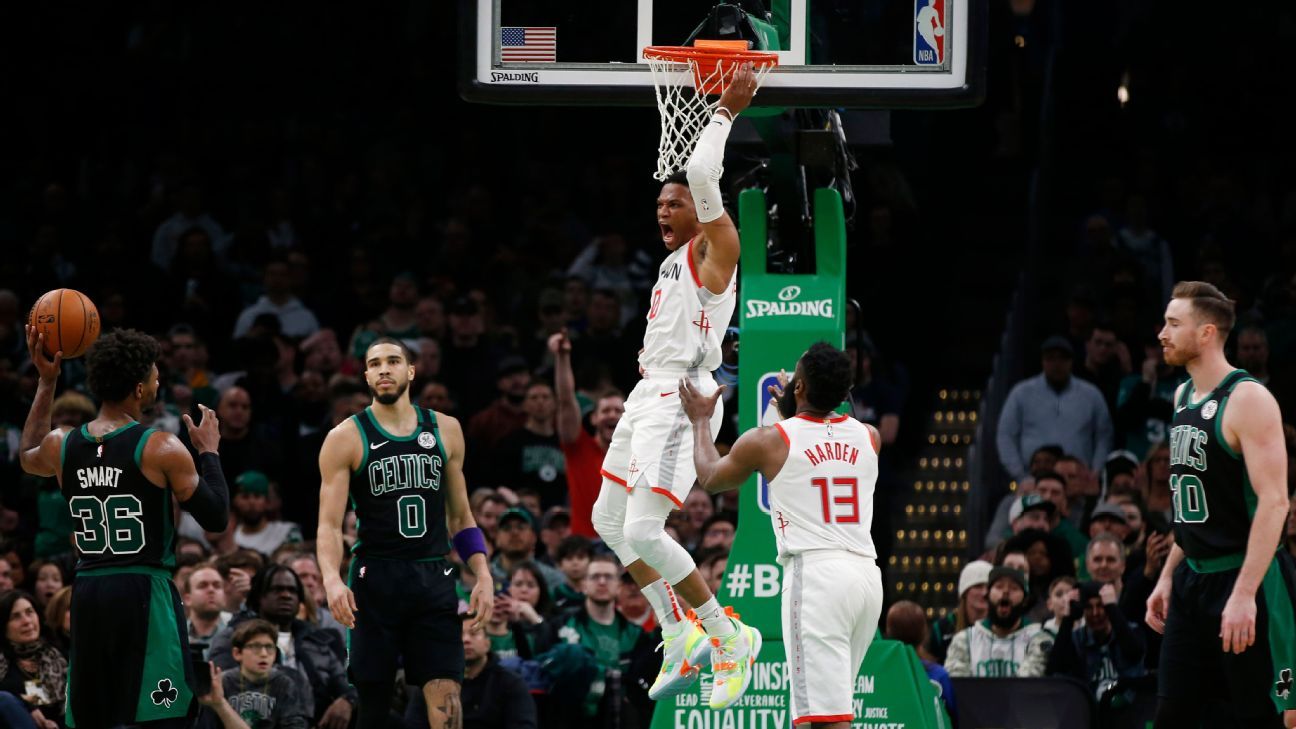BOSTON — Since the moment James Harden became a member of the Houston Rockets in October 2012, the team has been almost exclusively built around him and his prodigious talent. That has led to plenty of Rockets victories on the back of Harden’s incredible offensive displays. And when Houston has lost, it can generally be traced back to Harden having a rare off night.
Saturday against the Boston Celtics at TD Garden was one of those rare off nights. Harden finished with just 21 points on 7-for-24 shooting — including 4-for-17 from 3-point range — and took only three free throws. It was the kind of performance, with Harden’s Rockets, that would typically see them lose.
These days, though, the Rockets aren’t exactly Harden’s Rockets anymore. Yes, he still leads the league in scoring, averaging 34.9 points per game. But over the past few weeks, Russell Westbrook — in a way no player has since Harden was traded away from Westbrook and the Oklahoma City Thunder more than seven years ago — has become a co-headliner on Houston’s marquee.
And after Westbrook finished with 41 points on 16-for-27 shooting to go along with 8 rebounds, 5 assists and 3 steals in Houston’s 111-110 overtime victory, it was just the latest proof that the days of the Rockets being solely Harden’s team are over.
“You can’t go to the supermarket and buy heart,” Rockets coach Mike D’Antoni said of Westbrook after the game. “You know he has that.
“It’s pretty impressive.”
0:44
Mike D’Antoni is effusive in his praise for Russell Westbrook after the Rockets’ overtime road win over the Celtics.
When the Rockets chose to utterly transform their team at the Feb. 6 trade deadline, sending out center Clint Capela and a first-round pick as part of a multiteam trade that saw them get back combo forward Robert Covington, they said it was a move designed to allow them to go all-in on playing small.
In reality, though, it was also something else: an admission that Westbrook — an unreliable 3-point shooter in the best of times, and who is shooting 25% from deep this season — simply couldn’t coexist with another non-shooter on the court. But in committing to this style, the Rockets have also done the unthinkable: made their team something beyond one that orbits around Harden’s wizardry with the ball.
Consider D’Antoni’s response to a question before Saturday’s game about whether the days of Harden being relentlessly double-teamed — as he has been so often in recent years — are now over with the style Houston is now playing.
“I think in certain situations, what we’re seeing now is he gets doubled sometimes in the pick-and-roll,” D’Antoni said. “End of clock, they might double him.
“But I think the random, as-soon-as-he-crosses-half-court double, is gone.”
That would have been unimaginable even as recently as a couple of months ago, when Harden was bumping up against averaging an astonishing 40 points per game and continuing the same kind of absurd production he’s put up repeatedly in recent seasons — including finishing first or second in the NBA’s Most Valuable Player voting in four of the past five.
But given the way the Rockets — and Westbrook — are playing now, it’s understandable. By having five quick, interchangeable players spread around the 3-point arc, there are all sorts of driving lanes available for Westbrook to attack. And while he has his flaws as a player, his ability to explode past defenders in one-on-one situations — particularly without any size behind them to defend the rim — has never been one of them.
As a result, since Capela played his final game with Houston on Jan. 29, Westbrook’s 3-point attempts have dropped significantly, and his field goal percentage has shot well north of 50% — to the point where he’s now shooting a career-best 47% for the season. Meanwhile, his usage rate has shot up to a staggering 36.1% — putting him ahead even of Harden (34.2) during that same time frame.
“I don’t know, man,” Westbrook said, when asked if Houston’s stylistic changes have put him in better positions offensively than he’s ever been in during his NBA career. “I just try to find ways every year to be better and find ways to become a better player and teammate. Obviously based on the changes we made and the way we line up, I have to find ways to constantly keep being effective and help my team win games and that’s what I try to do.
“Right now I think I’m moving in the right direction. I’ve just got to stay locked in on what I’m doing and my craft and keep doing what I’ve been doing since I’ve been in the league, and that’s going out and competing every night.”
Houston’s gradual shift in Westbrook’s direction has also seen the Rockets take on an additional characteristic of his: the sheer physicality with which he plays. While Houston has played plenty of small ball and employed switching schemes across the board in the past, there is just something different about the relentlessness with which Westbrook batters into a defense like a sledgehammer over and over again.
It was no coincidence that Boston, after jumping out to a 17-point lead in Saturday’s first half, slowly began wearing down as the game went along, and that Celtics coach Brad Stevens repeatedly referred postgame to Houston’s physicality as the reason why.
“Their physical presence is real,” Stevens said. “I think that when they turned it up a notch physically in the second half, we got stagnant because they were imposing their will on the game, and they can do that.
“It’s not a knock on our guys necessarily by any means. It’s just that that’s the strength of their team.”
It’s obviously far too soon to make any sweeping conclusions about a team that has fully committed to playing this way for only a month — a month that included a lengthy All-Star Break smack in the middle of it. But there is more than enough data from the games the Rockets have played against elite competition since then — victories over the Los Angeles Lakers and Utah Jazz, teams with elite big men (Anthony Davis and Rudy Gobert, respectively), plus a pair of wins over the Celtics — to at least say that Houston’s bold gambit has some semblance of a chance of working.
And to say that Westbrook has erased Harden from the offense would be equally foolish. Since Jan. 30, Harden is still averaging over 32 points per game, and remains a singular force of nature when he gets going.
The difference now in Houston is that, when he doesn’t, the Rockets have the Plan B that throughout his tenure — even when playing alongside other future Hall of Famers like Dwight Howard and Chris Paul — both Harden and the Rockets have never fully embraced.
“I think we guarded [Harden] well,” Celtics shooting guard Jaylen Brown said. “I think we accepted his challenge. We just didn’t do a good enough job with Westbrook.
“We had a lot of attention on James Harden, and forgot about the other MVP over there. He came out and asserted himself early and took over and dominated this game.”
And, as a result, Houston won a game it rarely would have in the past. It’s a formula the Rockets will hope will translate to them finally breaking through this spring in a way they haven’t been able to previously, either.

